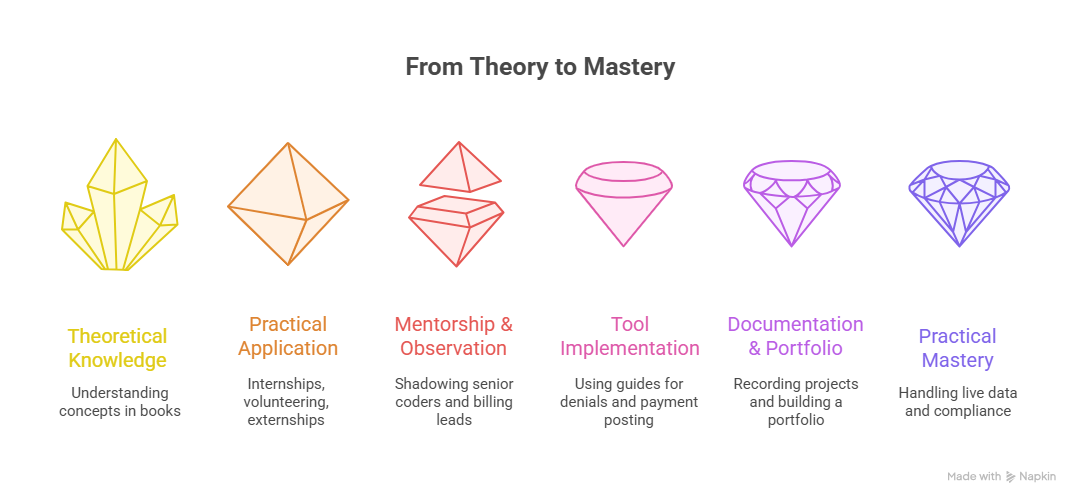Step-by-Step Guide: Starting a Career in Medical Billing and Coding
Medical billing and coding have become the backbone of modern healthcare finance, merging clinical accuracy with digital precision. In 2025, coders are no longer back-office workers—they’re compliance strategists who ensure hospitals stay profitable, ethical, and audit-ready. With automation reshaping every payer workflow, this field now rewards analytical thinkers who combine regulatory fluency with technology literacy. Whether you’re switching careers or stepping into healthcare for the first time, this guide—built on AMBCI’s certification standards—shows exactly how to plan, train, and thrive in a future-proof billing and coding career.
1) Understanding the Industry Landscape
Before investing in training, it’s vital to understand how coders keep healthcare running. According to Mastering Revenue Cycle Management: Complete Guide, each accurate claim submission directly influences hospital cash flow. Coders translate complex medical records into universal codes, bridging the gap between providers and payers.
Industry demand is projected to grow 9 % by 2027. Roles span from claims analyst to reimbursement auditor, each requiring deep knowledge of policy, software, and ethics. Reading resources such as Medical Billing & Coding Careers in California and Florida Medical Coding Career & Salary Outlook helps compare pay scales and discover where emerging AI-driven billing hubs are forming.
Aspiring coders who understand compliance, audit flow, and technology from day one position themselves for faster promotions and hybrid RCM roles that pay 30 % above the entry average.
2) Getting Certified: Your Professional Launchpad
Certification separates job seekers from professionals. The AMBCI Medical Billing & Coding Certification equips students with the skills employers actually test for—HIPAA, ethics, and applied EHR practice. It also fulfills continuing-education standards for state and federal compliance.
Supplement core training with Ethical Practices in Medical Billing and Understanding HIPAA Compliance in Medical Billing. These courses teach how to safeguard patient data while maintaining speed and precision.
Finally, study automation frameworks in Future Skills Medical Coders Need in the Age of AI. Graduates who blend certification with AI literacy often move directly into hybrid analyst roles or remote compliance contracts—proof that credentialed coders lead the new healthcare economy.
3) Building a Solid Knowledge Foundation
Great coders don’t just memorize codes—they understand medicine, policy, and finance. Begin with AMBCI’s Comprehensive Guide to Clinical Documentation Integrity (CDI) to learn how accurate documentation prevents denials and ensures ethical billing. Then explore Essential Guidelines for Accurate Clinical Documentation for building physician-coder collaboration.
Layer these skills with emerging-tech exposure from AI in Revenue Cycle Management: Upcoming Trends for Medical Coders. Understanding how AI pre-audits claims or flags anomalies lets you work smarter, not harder.
Finally, benchmark your progress with mock audits and EHR exercises. Continuous practice creates muscle memory—allowing you to code confidently under deadlines while maintaining 98 %+ accuracy rates demanded by top employers.
Quick Poll: What’s Holding You Back From Starting?
4) Gaining Practical Experience
Hands-on experience transforms theoretical understanding into mastery. Apply for internships, volunteer positions, or remote externships offered through AMBCI’s partner clinics. Use Comprehensive Guide to Denials Prevention and Management to recognize denial patterns and craft evidence-based appeals.
Shadow senior coders or billing leads to learn real-world shortcuts—how they interpret ambiguous provider notes or balance multiple payer policies. Implement tools discussed in Guide to Effective Payment Posting and Management to reconcile payments efficiently.
Document every project you complete; recruiters value quantifiable experience. Even unpaid practice builds a portfolio that proves you can handle live data, compliance challenges, and time-critical claims. Pair this with weekly study from AMBCI’s audit case archives to stay aligned with national standards.
5) Choosing a Specialization & Remote Career Path
Once certified, specialization magnifies your income potential. Niche coders earn 20–40 % more because they master complex payer rules. Consider reading Comprehensive Coding Guide for Telemedicine Services to understand modifiers and parity laws shaping remote care reimbursement.
Those drawn to hospital or radiology settings should pursue Advanced Billing & Coding for Interventional Radiology, while compliance-focused professionals excel after studying Ethical Practices in Medical Billing.
Remote work remains a major advantage in 2025. Review Future of Remote Medical Billing & Coding Jobs: Trends & Predictions to design secure workflows, encryption habits, and daily routines that keep you productive and compliant from anywhere in the world.
6) FAQs: Starting a Billing & Coding Career in 2025
-
Most AMBCI learners finish in 6–9 months. Adding a 3-month externship helps convert learning into hire-ready experience.
-
The AMBCI Medical Billing & Coding Certification remains the benchmark for compliance-driven, AI-aware coders.
-
Yes—after proving HIPAA readiness through Future of Remote Medical Billing Jobs.
-
Entry-level coders typically earn $45 K–$55 K annually; with specialization or remote credentials, that can surpass $70 K by year three.
-
Follow audit frameworks in Comprehensive Guide to Medical Coding Audits and ethics checklists in Ethical Practices.
-
Critical thinking, attention to detail, and proactive communication with providers and payers—traits refined through AMBCI collaborative projects.
-
Track regulatory briefings inside Upcoming Regulatory Changes Affecting Medical Billing 2025–2030.


